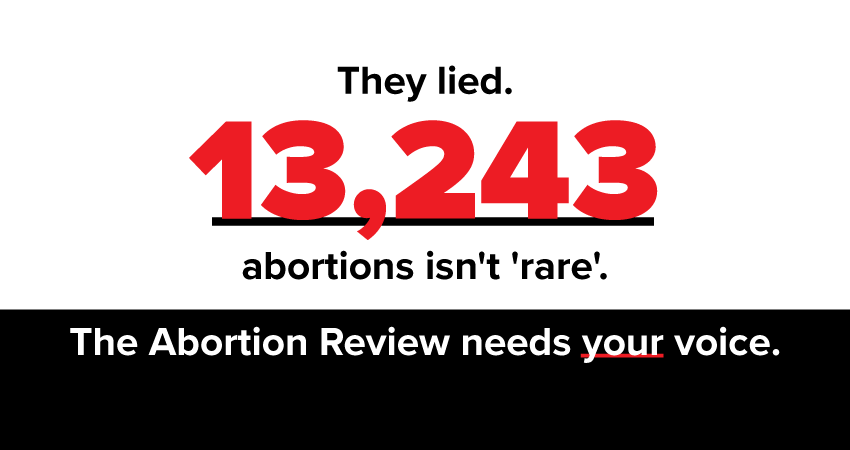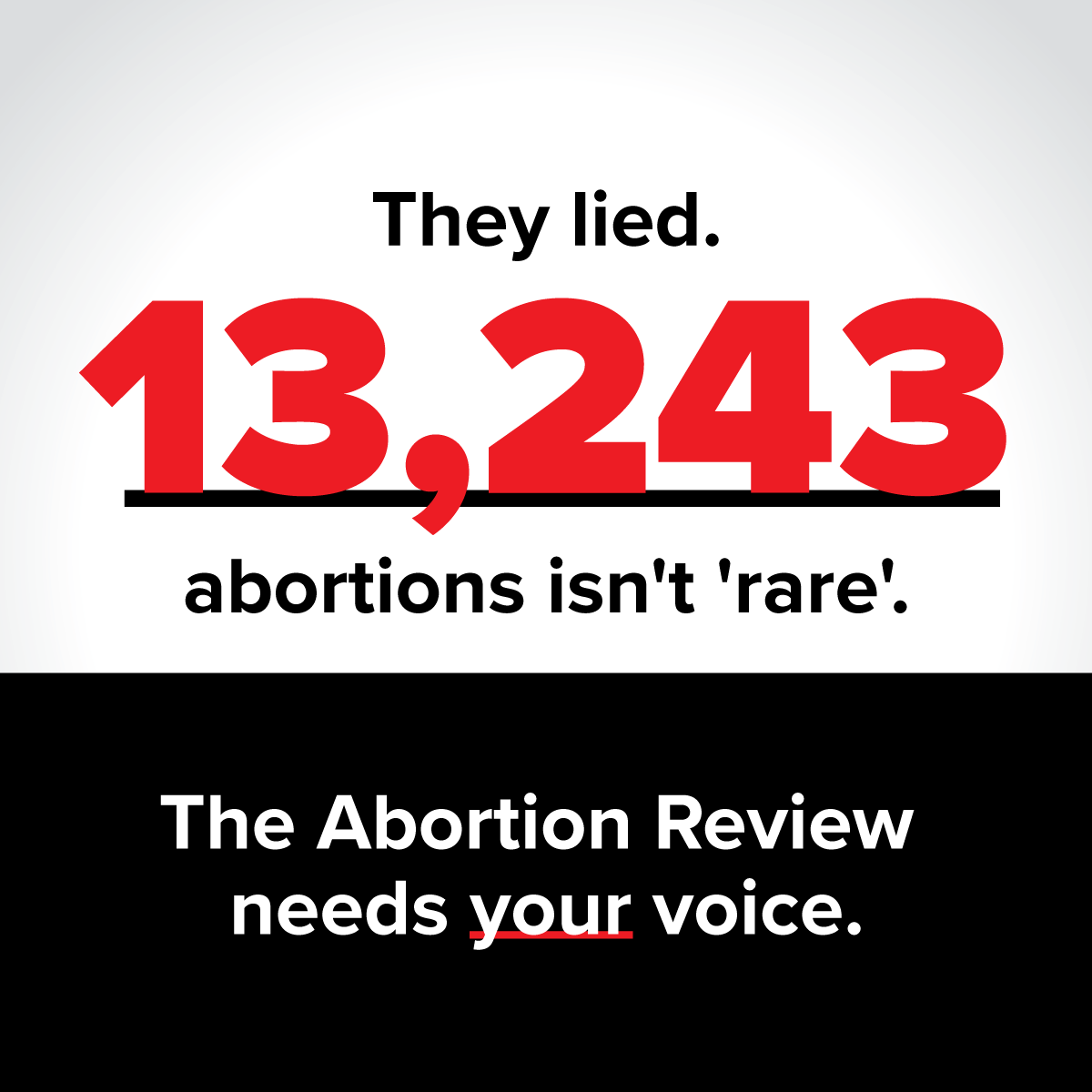
The Abortion Review – what you can do to prevent a whitewash
UPDATE JANUARY 2022: The deadline for public submissions on the Abortion Review is 1st April. We will be in touch with helpful information about writing a submission and an address to email/post the submission to.

The Minister for Health, Stephen Donnelly has told the Cabinet that a review into the abortion law introduced in 2018 by his predecessor, Simon Harris, has been set in place. The review is obligated by the legislation.
Some 6,666 abortions took place in Ireland in 2019, the first year of the abortion regime - more than double the number of abortions which had been carried out on 2,879 women who travelled to Britain for the procedure in 2018. An unknown number of women, estimated by some at 1,000 or more, also took abortion pills in that year.
Another 6,577 abortions followed in 2020 - with a total of 13,243 abortions in the first two years alone. The shocking rise in the abortion rate reversed almost a decade of decline in the number of abortions undergone by women living in Ireland up to 2019. This massive upwards shift was predicted by pro-life activists during the 2018 referendum and strongly denied by abortion campaigners including members of government. In fact, then Taoiseach Leo Varadkar promised voters that abortion would be "rare".
Now that the legislation is under review, there are concerns that Minister Donnelly will adopt the 'all abortion good, all the options bad' mantra which seems to have become the catchphrase of legislators since constitutional protections afforded to preborn children were removed.
Unless the review is simply a rubber-stamp for the abortion regime and a platform for abortion campaigners to further expand this already radical law, Donnelly should take care to both set the correct terms of reference for the review, and to ensure critical voices are heard.
It is essential that the review investigates the often devastating failures of the abortion legislation - including the abortion of a perfectly healthy 15-week baby in 2019 on the basis of a misdiagnosis in Holles Street hospital. The parents of the baby boy indicated they felt under pressure to abort their child, and were told not to wait for the result of a second test.
The recent, shocking revelations from studies published in peer-reviewed journals have confirmed that late-term abortions are happening in Ireland – something voters were promised would not happen. This also needs to be examined in the review.
Factors which might reduce the abortion rate should be obviously be explored. The public were promised in the referendum that a three-day waiting period and a requirement to visit a GP before being prescribed the abortion pill would make the regime ‘restrictive’. Now campaigners are seeking to have that promise disregarded.
A public consultation – where submissions can be sent to the review - will be managed by the Department of Health and was expected in Autumn 2021. It has now been pushed to early in 2021 according to reports.
But unless the 'terms of reference' now being set for the review allow for a full examination of the outcomes of the abortion law thus far, the process won’t be worthwhile. David Mullins has an excellent piece here outlining the serious concerns with the review, including its 'terms of reference' - what the review will examine.
In that regard, we urges pro-life people to speak up to seek fairness in the process.
ACTION: Tell your TD to seek inclusive terms of reference for the review
Please take a moment to call or email your TDs (find their details here) and see a sample letter below:
A. An analysis of why the abortion rate increased so rapidly to 6,666 abortions in 2019, and what can be done to reduce the number of abortions. We were told during the referendum that abortion would be 'safe, legal and rare', yet the sharp increase has not prompted any actions by the HSE.
B. An investigation into the case where a 15-week baby was misdiagnosed with a severe disability and then aborted in Holles Street, with a view to establishing a protocol to ensure parents not pressured into having an abortion - and are given factual, peer-reviewed information and offered support.
C. An investigation as to why a study published in the British Journal of Obstetrics and Gynaecology in October 2020 by researchers from UCC said that doctors in Ireland were left 'begging for help' if babies survived late-term abortions.
D. An investigation into why the same study confirmed that feticide - administering a lethal injection to the unborn baby's heart - was being carried out in Ireland, despite assertions in the referendum that late-term abortions would be illegal.
E. Ensuring transparency in relation to another study - also carried out abortion-advocating medics - and published in April 2021, which said that senior Irish doctors were being trained internationally to carry out late-term abortions, using a horrific method known as 'Dilation and Evacuation' despite assertions in the referendum that late-term abortions would be illegal in Ireland. What is happening in this regard needs to be made transparent to the public.
F. An examination of the information and record-keeping around the provision of abortion in this country which needs to be radically overhauled, to bring Ireland into line with other countries. Data which can help to ensure a better public understanding of why women undergo abortion must be made available, and statistics regarding outcomes after abortion are communicated. Currently, the only information being published is the number of abortions, nationally and per county, per year - and the number of abortions being carried out under each ground of the abortion act. It was revealed recently, for example, that no national reporting system is in place in relation to adverse outcomes to using the abortion pill. The report on the abortion regime should not be a tool to conceal negative outcomes after abortion.
G. A review of counselling made available to women who are seeking abortion. Almost 1,000 women did not undergo an abortion after a first consultation with an abortion provider, indicating that the three-day waiting period is a positive measure to reduce the number of abortions. The review should also consider ensuring that women who approach GPs for abortion are told about the Abortion Pill Reversal process, where women can change their mind and safely reverse the effects of abortion.
H. The review must also hear from pro-life doctors and nurses, in regard to their experiences with the abortion regime and especially in regard to conscientious objection
During the review process, we will be providing a full and factual analysis to assist all those seeking to make a submission to the public consultation and will also address these key questions
1. The 3-day waiting period - which has been shown to have saved almost 1,000 lives in one year alone
2. Late term abortion
3. Pain Relief for preborn babies in late-term abortion
4. Abortion Pill Reversal - make women aware that this process is available in Ireland - and should be provided by the HSE
Sample Letter to TDs about the Abortion Review
Dear
I hope this finds you well. As you know, the Minister for Health, Stephen Donnelly has told the Cabinet that a review into the abortion law introduced in 2018 will take place soon.
It is vitally important that this review is transparent and meaningful - and not simply a whitewash of the appalling outcomes from the abortion regime which must be investigted and examined.
Unless the terms of reference now being set for the review allow for a full examination of the outcomes of the abortion law thus far, the process won’t be worthwhile.
I am urging you to tell the Minister to ensure that the terms of reference for the review includes:
- An analysis of why the abortion rate increased so rapidly to 6,666 abortions in 2019, with another 6,577 in 2020, and an examination as to what can be done to reduce the number of abortions. We were told during the referendum that abortion would be 'safe, legal and rare', yet the sharp increase has not prompted any actions by the HSE.
- An investigation into the case where a 15-week baby was misdiagnosed with a severe disability and then aborted in Holles Street, with a view to establishing a protocol to ensure parents not pressured into having an abortion - and are given factual, peer-reviewed information and offered support
- An investigation as to why a study published in the British Journal of Obstetrics and Gynaecology in October 2020 by researchers from UCC said that doctors in Ireland were left 'begging for help' if babies survived late-term abortions.
- An investigation into why the same study confirmed thatfeticide - administering a lethal injection to the unborn baby's heart - was being carried out in Ireland, despite assertions in the referendum that late-term abortions would be illegal.
- Ensuring transparency in relation to another study - also carried out abortion-advocating medics - and published in April 2021, which said that senior Irish doctors were being trained internationally to carry out late-term abortions, using a horrific method known as 'Dilation and Evacuation' despite assertions in the referendum that late-term abortions would be illegal in Ireland. What is happening in this regard needs to be made transparent to the public
- An examination of the information and record-keeping around the provision of abortion in this country which needs to be radically overhauled, to bring Ireland into line with other countries. Data which can help to ensure a better public understanding of why women undergo abortion must be made available, and statistics regarding outcomes after abortion are communicated. Currently, the only information being published is the number of abortions, nationally and per county, per year - and the number of abortions being carried out under each ground of the abortion act. It was revealed recently, for example, that no national reporting system is in place in relation to adverse outcomes to using the abortion pill. The report on the abortion regime should not be a tool to conceal negative outcomes after abortion.
- A review of counselling made available to women who are seeking abortion. Almost 1,000 women did not undergo an abortion after a first consultation with an abortion provider in 2019, indicating that the three-day waiting period is a positive measure to reduce the number of abortions. Almost 20% of women seeking abortion changed their mind in the three-day wait in 2020. The review should also consider independently examine the provision of the Abortion Pill Reversal process, where women can change their mind and safely reverse the effects of abortion, since some wpmem seek this option after taking the first abortion pill.
And the review must also hear from pro-life doctors and nurses, in regard to their experiences with the abortion regime and especially in regard to conscientious objection
Many thanks,
Name and Address
Featured
- Man jailed for 9 years for forced abortion
- Abortion coercion has arrived in Ireland – the NWC are silent
- Review of at-home abortions 'needed after coercion case'
- French Govt to remind 29-year-olds of biological clock
- Huge factor in decline in primary school numbers ignored
- Germany Denies Promoting Abortion Abroad—While Funding Pro-Abortion NGOs
- Govt don’t oppose Coppinger abortion bill at 1st stage
- March for Life: Vance, the White House, and a Divided Pro-Life Movement
- Paris’ Annual March for Life Puts Euthanasia in the Spotlight
- Britain’s seemingly limitless abortion rate
- The importance of the work carried out by Every Life Counts
- Puerto Rico officially recognizes unborn children as ‘natural persons’
- Assisted suicide laws stalled by “complex” legal issues
- Yes, that hideous celebration of 300 abortions is real
- White Crosses Memorial: Dungarvan once again pays its respects to our aborted babies
- Josiah: Abortion Survivor
- Rally for Life 2025



























